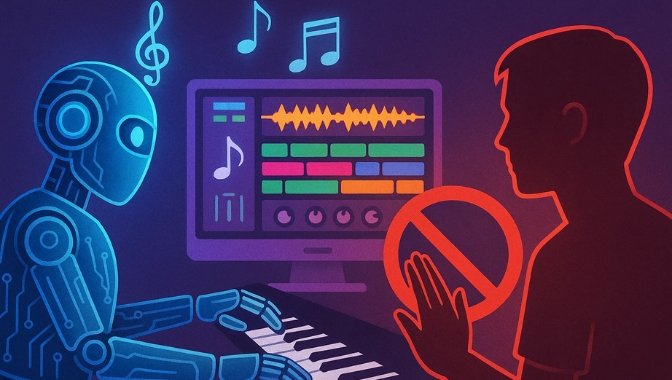As artificial intelligence continues to transform creative industries, the music world is facing a new era of disruption. From viral YouTube videos to chart-topping Spotify streams, AI music is becoming nearly indistinguishable from human compositions, and it’s raising questions about creativity, connection, and credibility.
AI Music Is Quietly Taking Over Streaming Platforms
A recent study by France’s International Confederation of Societies of Authors and Composers warns that Artificial intelligence music could account for up to 20% of streaming revenue by 2028. That’s no small number. Platforms like YouTube have already seen AI-generated albums like the fictional “Rumba Congo (1973)” circulate without clear disclosure. Although YouTube technically requires AI-generated content to be labeled, many users never scroll far enough to see it.
Spotify, on the other hand, has yet to introduce any visible labeling or public policy around AI music. As a result, listeners are often unaware they’re hearing machine-created sounds. Frustration is growing, with user petitions demanding transparency and even the option to opt out of AI-created tracks altogether.
Also Read: One Last Game: Squid Game’s Story Reaches Its Breaking Point
Artificial Intelligence, Music, and the Loss of Emotional Connection
One of the major criticisms of Artificial intelligence music comes from artists and academics alike. “With AI, we lose the ability to connect emotionally with the creator,” says María Teresa Llano, associate professor at the University of Sussex. Unlike human musicians, AI lacks stories, inspirations, and lived experiences, elements that are often deeply embedded in traditional music and help forge emotional bonds with listeners.
Platforms Defend the Use of AI in Creativity
Despite the backlash, major platforms are standing their ground. Spotify co-president Gustav Söderström argues that AI tools can democratize music creation and reduce entry barriers for aspiring artists. He distinguishes between music fully generated by AI and tracks where AI is used as a supportive tool. Still, copyright issues and ethical concerns remain largely unresolved.
As AI music grows more sophisticated, the line between man-made and machine-made becomes blurrier. What’s at stake isn’t just who made the music, but whether that even matters anymore.











